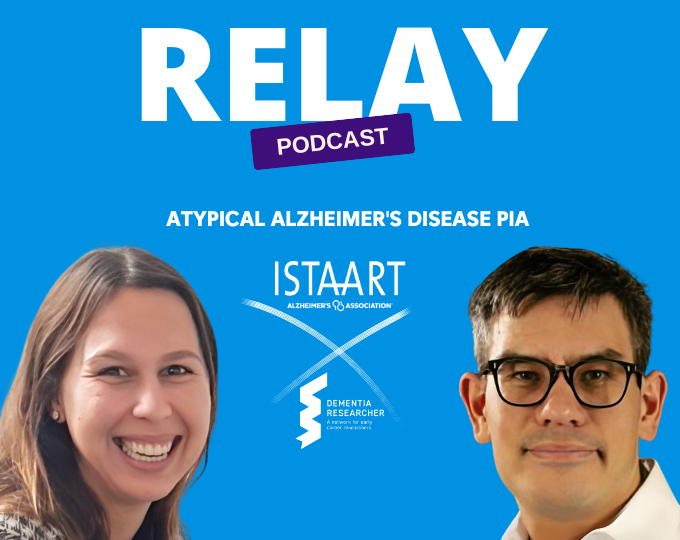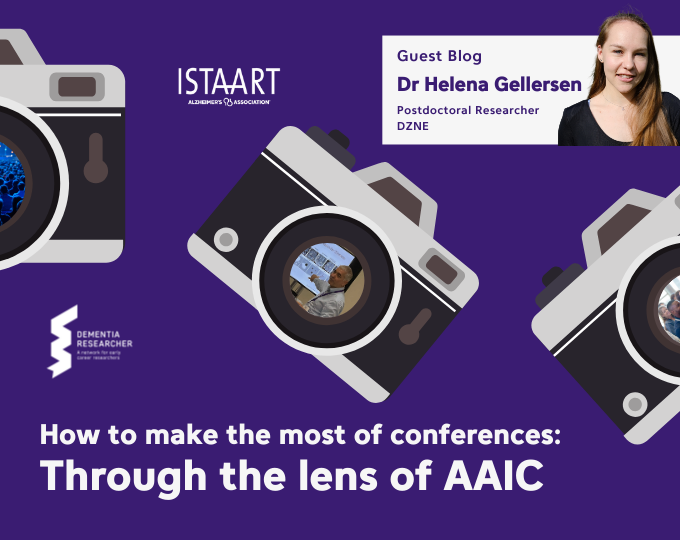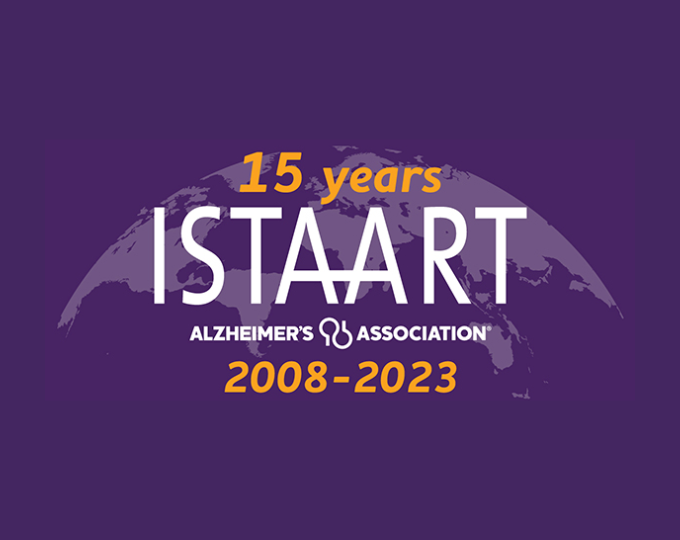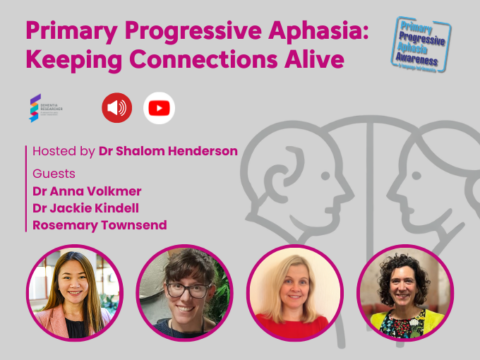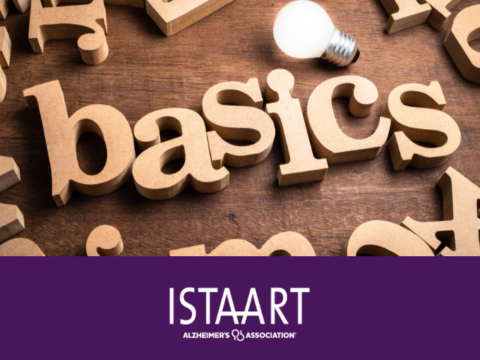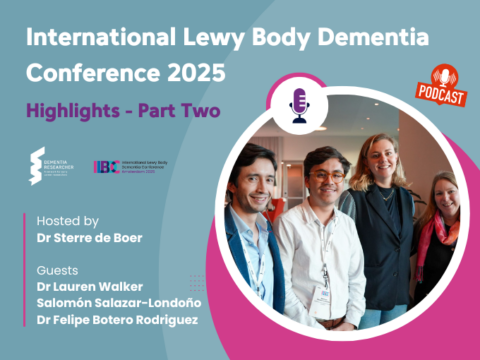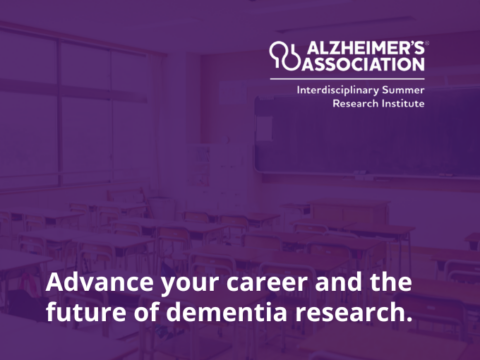Welcome to the last show in this season of the ISTAART PIA Relay Podcast, presented by Dementia Researcher. In our final episode, we come full circle with Dr Keir Yong, Senior Research Fellow at UCL's Dementia Research Centre, speaking with Professor Arlene Astell, Chair of the Non-Pharmacological Interventions PIA.
Professor Astell discusses her role as a Professor of Cyber Psychology at Northumbria University and Director of the Dementia Ageing Technology Engagement Lab at the University of Toronto. She offers a comprehensive look into her journey into dementia research, sparked by early interactions with individuals living with dementia, and her commitment to understanding and mitigating the cognitive and behavioural challenges they face.
Gain insights into the innovative projects led by Professor Astell, including the development of touchscreen computer systems designed to support conversation for people with dementia. How the significance of lifestyle interventions, such as nutrition and physical activity, and the emerging potential of neuromodulation can play a role in reducing dementia risk.
The conversation also highlights the broader implications of non-pharmacological interventions, the challenges in implementing these approaches within health systems, and the importance of influencing public health policy to ensure wider adoption – and the role that the Non-Pharmacological Interventions PIA can play in fostering collaboration.
Voice Over:
Hello, and thank you for listening to the fifth season of the ISTAART PIA Relay podcast, brought to you by Dementia Researcher. ISTAART is a professional society and part of the Alzheimer's Association representing scientists, physicians, and other dementia professionals active in researching and understanding the causes and treatments of Alzheimer's disease and other dementias. In this six-part series, we have members of ISTAART professional interest areas taking turns at interviewing their colleagues and being interviewed themselves with the interviewee going on to be the next episodes interviewer, we're sure you've listened before, so you know what to expect. We'll be releasing one of these podcasts each day in the buildup to the Alzheimer's Association International Conference, which this year takes place in Philadelphia.
Through the series, we hope you'll learn more about some of the amazing research happening in different fields of discovery and about the great work taking place in the ISTAART PIAs. Thank you for listening.
Dr Keir Yong:
Hello and thank you for joining this final episode of the ISTAART Peer Relay Podcast, brought to you by Dementia Researcher. My name's Keir Yong. I'm a Dunhill Medical Trust senior research Fellow and a principal research fellow at the University College of London Dementia Research Centre, and I work on the atypical ad professional interest area as the vice chair. Today I'm delighted to be talking to Professor Arlene Astell. Hi, Arlene. Can I begin by asking you to introduce yourself and tell us which peer you are involved with?
Professor Arlene Astell:
Yeah. Hi, Keir. Thanks so much. I'm really excited to be here. Yeah. My name is Arlene Astell. I'm currently a professor of cyber psychology at Northumbria University in the UK and I'm also director of the Dementia Ageing Technology Engagement Lab or the date lab at the University of Toronto in Canada. And currently I'm the chair of the non-pharmacological intervention’s pier.
Dr Keir Yong:
Thank you. Could you give us a flavour of your own research and also what initially brought you to dementia research?
Professor Arlene Astell:
Okay, well I've been doing it for a long time, so I'll try to summarise. I actually came to dementia research through my initial experience after I graduated with a psychology degree. And one of my first job was to interview people in a large mental health facility that was being closed down. And I got to meet people living with dementia and I was absolutely fascinated. I wanted to understand what had happened to them, what was happening to them, what had brought them to this being in this hospital, and it just led from there. And I went on and did a PhD and have worked with people living with dementia ever since. So yeah, so unlike some people who come to it through perhaps family or personal experiences, it was really just meeting people sparked my interest.
And it's still very much there. I think so much we still don't know, but my actual research, so as I said, I have a psychology background and for me, I think that frames certainly my approaches and why I sit very much with in the non-pharmacological interventions approaches is that I approach things from a psychological perspective, which means understanding the relationship between cognition, which of course since the labels were we've done to neurocognitive disorders, we are recognising that dementia, cognition is a huge part of it. So, to me, that interrelationship between cognition and behaviour. So, behaviour is what we see people doing and that's mostly how people understand dementia is what they see, how the problems people have, but really, it's the cognitive underpinnings for their behaviour, which interests me as well.
So, I think having that framework helps to really bring that lens to understanding the challenges that people face, the changes that occur over time and the impact that has on their lives. So when I think about the types of research that I do, it's very much about seeing what those challenges are and what we can do either to prevent them if possible or mitigate them, maintain people's abilities for as long as possible, but also mitigate some of the impact which it can have on their personal relationships, their confidence, their ability in social situations, their loss of comfort, their loss of skills and dementia affects the whole person. And we talk about people living with dementia. So, there's so many aspects of a life with dementia that really need support and assistance, and also that changes over time. So, it's a very complex situation that people are in.
Dr Keir Yong:
And that resonates strongly with other podcasts on these series, like they're partnering with a research participants peer. Where to paraphrase, I think it's fair to say that a large majority of people living with dementia would consider some of the areas you talk about really to be caught to their experiences, whether it's some of those cognitive symptoms, whether it's the behavioural manifestations or as you mentioned, some of the implications for people's day-to-day independence and a desire to maximise people's independence.
Professor Arlene Astell:
I mean, I started out, I did actually a very experimental traditional sort of PhD, which was psycholinguistic based. So, I did lots of experiments about speech production and followed that very traditional path. But what was fascinating was realising that the people I worked with, and they were primarily living with Alzheimer's disease and most of them had already reached quite a sort of progress stage. So, they were mostly living in care settings or as I say, in the hospital that I worked with. But what was interesting was that there were patterns in the impact that Alzheimer's disease had on their speech and their communication. So, it wasn't like blanket loss. In fact, there was lots and lots of retained abilities, knowledge, aspects of communication. And I thought that was actually the really important thing because that meant a different way of looking at it instead of just going, "Well, it's all downhill, it's progressive decline, everything disappears."
It was more, "Okay, let's try and understand why some things do go early, why some things are better retained. What can we do to leverage those ones that are well retained and mitigate or find ways rounds the ones that are more at risk or disappear more quickly?" And so, I was very fortunate that my very first research funding was actually creating a conversation support for people with dementia. And this really highlights this sort of bringing this approach of understanding the profiles of what is spared and what is impaired and trying to use that to improve the situation for people. So, the problem we were presented with was, well, it's very difficult for people to have conversations, because they can't remember the answers to things, they can't remember. Their families come and see them, and they say, "What did you do today?" And they don't know what they did today. But what we realised was actually there's not just a problem with memory, but there's a working memory problem.
If you're having a conversation, you've got to remember what's been said in the previous sort of terms. But the problem people we were working with seemed to have been they couldn't keep that in mind. Its whatever is here and now, and this is sort of nearly 25 years ago, so I'm not saying anything that people perhaps don't know now, but back then we saw that that was what we should be tackling. So, we created a touchscreen computer system and whatever was on the screen was what you were talking about. Or it could be some music you could sing along, you could be watching a little video clip and talking about it. And that had a transformative effect on the conversations because suddenly the cognitive abilities of the people living with dementia wasn't the issue anymore because they're doing this shared activity with one or more people, they're chatting about things they might be singing spontaneously, getting up and dancing, and suddenly the whole thing was changed.
And that was really revelatory to me and the people I was working with because it suggested we can do things to address some of these challenges that people are facing and not just sit back and go, well, it's all going to be downhill. I think the other thing I would mention is we used some very early touchscreen technology, so way before smartphones and so on, this is 2001, but they were very accessible, which I think is why we've seen them become so popular globally anyway, but that's another key thing. It's recognising that people have, the cognitive impairment they clearly have, creates a barrier to some interventions because of the cognitive load for them to learn how to do the intervention. And I think that's another really key thing to keep in mind when we're designing these non-pharmacological interventions.
Dr Keir Yong:
Well, that's a great prompt to bring us to what you consider to be very current areas for your research field. What are the current hot topics and what you feel are again particular exciting areas of development?
Professor Arlene Astell:
Yeah, well, I think it's very interesting and within our peer, we are very conscious that we've actually become a very broad, we have a very broad reach and a very broad range, which is definitely a strength. And we have a very broad membership. But it also means that when we are doing our events and activities, trying to sort of reach everybody is quite a challenge. But some of the areas, when we were established, one of the key things that was highlighted was the potential for lifestyle interventions, things that could reduce risk as well as interventions to support people to live as well as possible with dementia. And obviously in the last 10 years we've seen such a rise in the lifestyle interventions and also the rise in of the peers that are starting to look at some of these things. So, there's obviously the nutrition one, for instance, there's a sleep one. There isn't currently a physical activity one, but in our peer, we have people who are looking at all of these together.
So, it tends to be people doing those sort of multimodal interventions. And that's obviously something that's really still developing. I think as well, we have a lot of synergy, and we have membership who span other peers as well, like the SCD group because obviously SCD has increasingly become a target for modifications and interventions. Another area though, where we've certainly had seen a lot of interesting work is in the neuromodulation again, which is more in the preventive end of things. And in our year-end review, not in 2024, but in 2023 for example, there was a lot of interest in the evidence that's emerging. And really the questions are always, when can we get this? Where can I go and have this done? And I think that's one of the interesting challenges that we face is bridging that gap from the research to the real-world applications.
Because what it shows us whenever we do these public events or events that attract not just researchers but lots of clinicians and lots of frontline workers who are engaged in this, they're looking for what can I tell my clients to do? What can I offer my patients? And that's where I think the non-pharmacological interventions particularly are very popular, but people want something they can pick up and say, "I can tell my patients to do this, or here's an activity." And I think that's one of our, whilst there's great progress going on, there's also these challenges of actually how do we get them to people?
But I would also contrast that when we did our year-end review this year, it was from a completely different aspect and it was actually about technologies, but ones that support people at home that support caregiving, that support that dyadic relationship and various innovations that are supporting that. So, I think those highlight how the scope of non-pharmacologic interventions is really blossoming and there are so many areas where the value and the potential are being recognised that makes it a very exciting time. So yeah, that's just some of the things that we're doing.
Dr Keir Yong:
And you mentioned, again, the broad scope of the non-pharmacological interventions peer, and you also mentioned some, again, of the challenges regarding implementation and effectively health system capacity. So, one following question I have is where do you see the role of say more public health research or perhaps more again, research relevant influencing policy sitting amongst the peers? Do you feel this is something which is particularly relevant to your peer or something that sits between a number?
Professor Arlene Astell:
I do actually. I am more familiar with the statistics in the UK, but I guess the breakdown is similar in most countries. But if you look at the cost of dementia for any year, almost half of it is family care is the cost of families. In the UK, the biggest proportion is social care. And I know not every country has exactly the same system of social care, but healthcare is the very tight, smallest bit by far, 10% or less of the cost. And I think that is a really, now that might be different in the US, which is an insurance-based system, so it's very different, but in the UK, health is not the dominant provider for people with dementia. And I think that is really important for understanding the potential idea of a pipeline. Because when its pharmacological, people understand that pipeline, you go to the doctor, the doctor gives you the medication or infusion or whatever we are talking about.
If it is not pharmacological, first of all, the evidence base, often these large scale RCTs are not as prevalent, haven't had, there aren't so many of them. And there are, so what would I call it? The processes for initiating and disseminating and implementing these is much more fragmented in some ways, the standard that's required and the evidence base that will make the commissioners say, "We're going to roll this out for everyone." If you look, as I say in the UK, I think there's only one non-pharmacological intervention that was recommended. Oh, it might be two now, but it's very small in comparison to the numbers that exist and the research projects that are ongoing. So, I do think engaging more with policy makers around to raise their awareness of how these complex, comprehensive needs of people living with dementia and the availability of the range of interventions, but also to understand from them what would give them comfort enough to commission or support the rollout of these.
And also, that has workforce implications because currently we don't have, certainly in the UK, maybe other countries do, but I'm not aware particularly of this, but like a role that is supporting people living with dementia, particularly to access all these different elements of their life. So, I think who would do these? I think there are many questions. So, for researchers, and this is not meant to scare people, but it's more like the reality, doing good work, getting good, exciting results, publishing it, presenting it does not mean it will be adopted in this non-pharmacological space. And I think that's something collaboratively we need to engage with we do, because there's lots of really promising things, but the majority are not getting out there.
Dr Keir Yong:
And it certainly sounds like there's a lot of learning that could be done through international conversations facilitated by things like my start where I may have misunderstood this, but from participating in one UK and Brazilian dementia care workshop, my understanding was at least in some parts of Brazil, there were some professionals who I think might fulfil a role that you touch on who essentially are working within or linked to primary care settings, but working between families, general practitioners and the third sector. But my understanding was again, it was a family who were taking on the greatest in terms of providing care, which I think is a recurring feature of a lot of systems.
Professor Arlene Astell:
Absolutely. And it's really interesting to hear that I have heard some innovative things happening in Brazil. It wasn't that particularly, but I also think it does raise this question as well of who will pay for these. So, if they are provided through the healthcare system, then that is attached to a budget and then presumably somebody to deliver it. But I think these are the questions that we definitely need to be asking now because with the global spread in the sense that there's far more countries who are starting to grapple with dementia for the first time. They will be also looking for, well, what are the things we can offer our population?
And if there are no very clear models, well this is the pharmacological efforts and these are a set of non-pharmacological that you can have, both for the individuals and their families who, as you say, provide the bulk of care, then that's another aspect. And I think for us, either the peer that I'm currently chair of or a number of peers who are working in allied challenges, maybe we should be leading that conversation and bringing those players together. Because whilst it's fantastic that there's so much focus now and effort and funding going into the exploring the potential pharmacological solutions or things that could help the people living with dementia still have very multiplying needs, and they are very costly to economies if we just carry on as we are.
Dr Keir Yong:
So, on that note, this week saw FDA approvals of Donanemab for the treatment of Alzheimer's disease, and this follows their approval of Lecanemab last year. So, I'd just like to get your thoughts on where you see the role of non-pharmacological interventions in perhaps complementing the anticipated increasing access to, again, disease modifying therapies, targeting Alzheimer's disease.
Professor Arlene Astell:
Yeah, I think it's a really interesting question. And obviously whenever you have these new approvals and the media coverage raises people's hopes and expectations and they want to know, can I just nip to the doctor now and get this? So, I guess any long-term impacts, we still have to see how this will roll out and what it will do. But for people who are living with dementia, the aspects of their lives that these new compounds could address and how they will address them, I think we don't really know enough yet to know exactly what it will look like in people's everyday life. So being able to still provide tools and resources and activities and strategies for people and their families to live with dementia.
Because it seems where we are now that they're not going to be, we are not talking about people being reversed, that their condition going away. And I think we also have to manage those hopes and expectations, but I don't know, maybe I'm not best placed to do it, but I know from previous things, people get very hopeful. They think, "Oh, it's fine, I'm just going to get this drug." And I think there is a lot of anticipation, but maybe the good thing is it raises awareness. And so perhaps that does open more channels for increasing availability of additional activities and things to help people manage with the changes they've already experienced, for example.
Dr Keir Yong:
And presumably that might be tied into some of the discussions you were having about things considered at a service or health system level as well. Hopefully there might be some complimentary conversations regarding capacity in the system.
Professor Arlene Astell:
Absolutely. Because actually, and that is a potential danger that we have to be aware of that health systems think, "Oh, we've got these drugs now, we've got compound, we can just, we're done, we're sorted." And that's definitely not because we haven't even really got going with. And also, we have to think about, there are multiple types of neurocognitive disorders, multiple, and many of them have very limited attention as you know, from the POU lead, but we are far from done and dusted. And I think there's a danger with creating that impression that, oh, approvals will resolve that, but rather keeping the effort going and thinking about all the people. For instance, I do.
And again, this is relevant in our peer because people with young onset dementia who have a multiplicity of challenges of living with typically not memory-based problems and losing their employment, the financial impact, trying to support they've got kids, and there are many, many people affected. So, when we are thinking about medications, we have to, I think getting that messaging that this is part of a picture as our non-pharmacological supports, as our formal services, but living with dementia is a very complicated scenario for people.
Dr Keir Yong:
So, going back to your peer specifically, how does the work of your peer support your area of research?
Professor Arlene Astell:
That's an interesting question. I was trying to think what I wrote when I did my statement to put my hat in the ring to become part of the executive. I guess for me, the peer, because it is very broad, and as I said, when I look at our actual underpinning statement, which talks about a biopsychosocial framework, I think for me it aligns with my approach of relating, as I said at the beginning, our understanding of cognition and how that is related with behaviour, but also that the impact is more than we can just see. It's the broader ripples that it has around the person. So, for our peer, we are very much a large-ish group that brings different perspectives, different ideas, different types of methodologies. Again, we are very sort of broad, very quantitative, qualitative mixed methods. It is a very broad grouping, but there are things that unite us.
So, for instance, one of the things we're particularly interested at the moment is what are meaningful outcomes? And that has always been an objective in our peer is identifying those. And obviously that involves working with people who are living with dementia and those close to them. But also, and this is where I think it comes back to that evidence base for commissioners or health services, what can we demonstrate this is going to do? And I think with the non-pharmacological interventions, especially for people who might have been living with the condition for a while, what does a positive impact look like? What is a positive outcome? In some studies, it may be some improvement on measures of cognition or some other, but it could be a functional ability, or it could be maintenance or slowed decline. And all of those can be positive depending on the context.
So, for us, our peer is very much about having those sorts of discussions about the different ways we can identify meaningful outcomes for people. Also, and this was another original aim, and it speaks as well to the evidence base, but improving the design implementation, evaluation and reporting of trials of NPIs. And I think when I was mentioning earlier about the multimodal interventions and those studies, I mean they've sort of addressed some of that by having these very extremely tight, robust designs, large numbers, et cetera. And that is, I think been positive for raising the bar, but also raising awareness of the power of non-pharmacological interventions.
I think we can benefit from that. I think if we look at non-pharmacological interventions, when people are further along with their life with dementia, what a positive intervention looks like is something that's a bit more nuanced. And I think as well, because we have interventions for caregivers too, and often they are these dyadic approaches, what are positive outcomes for caregivers, for family members particularly? So, all of those things were, there are obviously ongoing aims in our peer. I think they are also really important themes for early career researchers, students, people starting out in this domain to have sort of an appreciation of the context.
Dr Keir Yong:
And it's very encouraging again, to hear and the voices of people living with dementia again, and people close to them being front and centre in thinking about what outcomes are relevant to their experience. Can you tell me a bit more about how your peers organise and also a bit about your executive committee? Also, are there any opportunities to collaborate with the other peers?
Professor Arlene Astell:
Yeah, so I guess we have a fairly standard structure. We have a chair, sorry, deputy chair, who will then become the chair. We have a conference chair, a comms chair. We have somebody who leads on social media who's very good at doing that. And we have student rep, post-grad rep, sorry, post-doc rep, and then some ordinary members. We are quite a small committee, and most people are new in post for route this year except for me. So, we have been really, people have been getting to grips with their roles because a lot of them are very early career researchers, which is fantastic, who are bringing a whole range of different knowledge experiences from different countries.
We're a very global committee and a global peer with our membership is very spread across the world in terms of opportunities for collaboration, yes, we have some that we already have underway, like with the tech peer, with the SCD. Some of these are through members, but also ones we're exploring. So, you mentioned the one with people with lived experience and we've also explored the disparities. There are different ways we could collaborate, but I think as well, there are many opportunities within the peer itself as well for researchers who have ideas for areas to focus on white papers, reviews that they would like to get involved with as part of the peer. And we are very much encouraging that and as part of what our activity at the peer day will be in Philadelphia.
Dr Keir Yong:
On that note, so what has your peer got planned for its peer day? Are there any other things that you have installed for this year's AIC or over the coming year?
Professor Arlene Astell:
For peer day, this year we are doing a world cafe session, and the reason is our peer has been established for quite a few years. And in that time, one of the key areas was looking at, I guess, the potential of risk reduction and so on. And we've become aware that that sort of activity is increasingly of interest and also in part is emerging in other peers, which is fantastic. But we also want to a sense revisit some of the original aims, some of which I just said are still very current, but also to engage with the early career, the PhD students, the postdocs, sort of early career academics to set those priorities, to examine the ones we had from the start and then where we want to refresh what are new ones and really set that agenda for the coming years, which could include, as I said, white papers and so on.
We're also planning an education session, which we'll be focusing on the meaningful outcomes as one area. And we're also looking into applying for sort of a one-day workshop or conference to really look at this whole space and perhaps based on this discussion, including the piece around how to influence policy, what do you need to do to increase the uptake of non-pharmacological interventions, because that is definitely something that individual studies and researchers can experience as a bit of a barrier. So, I think that would be great as well to engage with the association and others who could have some assistance in thinking through what this needs to look like, because raising awareness is clearly a really crucial factor.
And just to, I mentioned I guess like many peers at the conference, we will have our posters, awards and so on. So, we have our team of PhD and postdoc reviewers. And I think that's actually really exciting. And I think hopefully bringing people together at the World Cafe, which if you've ever been to one, they're quite fun, they're quite frenetic and quite busy. People scribbling all over like tablecloths or sticky notes on boards and so on, and then someone has to make sense of it afterwards. But it's really a space for our membership to have their voice. And I guess for people who can't be there, they can share their thoughts electronically.
Dr Keir Yong:
And over the previous years especially, we've seen a lot more opportunities for people to engage, even if remotely, really it sounds like it's a very valuable opportunity.
Professor Arlene Astell:
A lot of times in other settings, we use these digital whiteboard systems where you can have your remote sticky notes. So, it's possible we can have some people doing the same activities, but joining it remotely, which would be great because we want as many voices as possible to contribute to this. And I know that now there's so many peers, we're all competing. There's five or six on at the same time. We only have an hour. But I would definitely encourage people who are members of this peer or are thinking about it to come along and share, give voice to what's important to them and what they want us to prioritise in the coming years.
Dr Keir Yong:
Well, thank you. And I think that brings us to our final question, which is why would you suggest listeners sign up to your peer?
Professor Arlene Astell:
Well, I hope I've given a flavour of the breadth of our interests and our expertise and our ambitions. I think for people who are not currently working in the more biomedical space but are actually either working with people who are living with dementia or working in memory assessment clinics or services in the community or in any other setting, and are interested in supporting people, supporting the families of people living with dementia, and really addressing some of the very naughty challenges that still exist. There are plenty of challenges still to be tackled, but also that we are a friendly, supportive community. We have this diversity of approaches of knowledge in different methodological expertise so people can come along and pair up with more experienced people, get mentorship. There's lots and lots of different ways that people can get involved and gain support through our peer.
Dr Keir Yong:
Thank you so much. So that's it for today's podcast. Thank you, Arlene for taking the time to join us today, and thank you for listening. Thank you for listening over the six shows. I hope these ISTAART peer relay podcasts have given you a sense of the scope, breadth, and depth of the peers and how they might help you expand your network and to find new collaborators. You can find profiles on myself and my wonderful guests, professor Arlene Astell, and information how to become involved in ISTAART on our website. You can find that on dementia researcher.nihr.ac.uk and also at alz.org/ISTAART. You should also check out the new ISTAART podcast, which is available on the Dementia Researcher website and the podcast apps. We're very much looking forward to the AIC conference, so if you haven't already registered, please visit als.org for more information and please come find us and say hello if you're joining in person. Finally, please remember to like, subscribe, and to leave review of this podcast while website, iTunes, Spotify, and SoundCloud, and all the other places that you might find podcasts. My name is Keir Yong. Thank you so much for listening.
Voice Over:
The Dementia Researcher Podcast was brought to you by University College London with generous funding from the UK National Institute for Health Research, Alzheimer's Research UK, Alzheimer's Society, Alzheimer's Association, and Race Against Dementia. Please subscribe, leave us a review and register on our website for full access to all our great resources. Dementiaresearcher.nihr.ac.uk.
END
Enjoyed the podcast? Please review, like, and share - and don't forget to subscribe to ensure you never miss an episode.
If you would like to share your own experiences or discuss your research in a blog or on a podcast, drop us a line to dementiaresearcher@ucl.ac.uk
Did you know... you can find our podcast in your favourite podcast app on mobile devices, and our narrated blogs are also available as a podcast.
This podcast is brought to you in association with the Alzheimer's Association, Alzheimer's Research UK, Race Against Dementia and Alzheimer's Society, who we thank for their ongoing support.
The views and opinions expressed by the host and guests in this podcast represent those of the guests and do not necessarily reflect those of UCL or Dementia Researcher

 Print This Post
Print This Post


